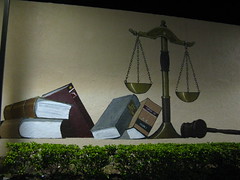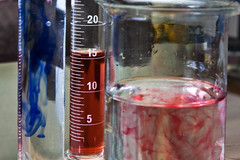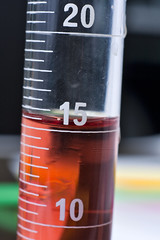
America's Top DUI DWI Lawyers™ and Attorneys at 1-800-DIAL-DUI or www.1800dialdui.com have successfully defended thousands of DUI DWI and Drunk Driving Arrests in Ohio, Illinois, Texas, Michigan, Virginia, Massachusetts, Colorado, California, Nevada, Oregon, Minnesota, Iowa, Florida, New Hampshire, Virginia, Arizona and Maryland.
Monday, January 10, 2011
DUI Appeal of the Day (DAD) - The “blackout” defense
Under the “blackout” defense,
"where the driver of a motor vehicle suddenly becomes physically or mentally incapacitated without warning, he is not liable for injury resulting from the operation of the vehicle while so incapacitated. However, once a prima facie case of negligence has been made against the defendant he must demonstrate that the sudden illness or incapacity could not have been anticipated or foreseen."
Trial evidence covering two days showed Shugars' blood pressure was 240/136 soon after the crash. He was treated for hypertension, kidney failure and swelling of the brain. The jury
Editor's thoughts: If a 'blackout' can be used to avoid civil liability, then proof of a blackout (as opposed to intoxication) should have an equal or better footing in a criminal DUI case... just thinking....
Visit Americas Top DUI and DWI Attorneys at www.1800dialdui.com or call 1-800-DIAL-DUI to find a DUI OUI DWI Attorney Lawyer Now!
Saturday, January 08, 2011
DUI Appeal of the Day (DAD) - Judgment of acquittal based on the margin of error
On appeal, the higher court found the trial courts ruling improper. Under the standards applicable, once the state puts in a result of 0.08 or more, then they have met their initial burden of proof (prima facie in a light most favorable to the State). In reversing though, the appeals court rejected the state's attempt to bar introduction of any evidence of a margin of error or other errors in the measurement of the breath (commenting that the state is trying to "overegg the pudding"). In fact, the court held that the margin of error, if proven, should be considered by the trier of fact in arriving at a verdict at the close of all evidence. The court suggested that the jury could accept or reject the margin of error evidence.
Editors notes: there is controversy over whether a margin of error can defeat a per se count as a matter of law. Further, the appeals court advised that it is improper for a trial court to take notice of testimony dehors the record.
Counsel should always be prepared to prove up a margin of error independent of the breath operators testimony, such as manufacturer's records, government studies, or experts.
Visit Americas Top DUI and DWI Attorneys at www.1800dialdui.com or call 1-800-DIAL-DUI to find a DUI OUI DWI Attorney Lawyer Now!
Friday, January 07, 2011
DUI Appeal of the Day - Hearing Officer's refusal to authorize subpoena improper
A hearing officer is expressly authorized to issue subpoenas for officers and witnesses identified in the documents submitted by a law enforcement officer pursuant to section 322.2615(2). See § 322.2615(6)(b), Fla. Stat. (2008). Here, Caner was identified in these documents. Furthermore, according to DHSMV's own rules, the procedural due process rights afforded a driver seeking formal review of a license suspension under section 322.2615 include “the right to present evidence relevant to the issues, to cross-examine opposing witnesses, to impeach any witness, and to rebut the evidence presented against the driver.” See Fla. Admin. Code R. 15A-6.013(5). The question of whether Auster timely rescinded her refusal to submit to a breath test is a relevant issue.
Continuing, the appellate court held that:
Where the witness' expected testimony would be relevant to the issues within the limited scope of the review hearing and would not be clearly cumulative, due process considerations require the hearing officer to issue a subpoena if the hearing officer has the authority to do so.
Visit Americas Top DUI and DWI Attorneys at www.1800dialdui.com or call 1-800-DIAL-DUI to find a DUI OUI DWI Attorney Lawyer Now!
Thursday, January 06, 2011
DUI Appeal of the Day - Drunk Driving Laws and Americans with Disabilities Act
(1) To take reasonable steps to accommodate the disability of profoundly deaf motorist who had been arrested for driving under the influence (DUI), as required under the Americans with Disabilities Act (ADA), arresting officer had to take appropriate steps to ensure that his communication with motorist was as effective as with other individuals arrested for DUI. Americans with Disabilities Act of 1990, § 202, 42 U.S.C.A. § 12132.
(2) waiting for oral interpreter before taking field sobriety tests was not reasonable modification of police procedures, in which officer who stopped motorist on suspicion of driving under the influence (DUI) had to engage to accommodate motorist's profound deafness;
(3) Actual communication between police officer and deaf motorist whom he had stopped on suspicion of driving under the influence (DUI) was not so ineffective that oral interpreter was necessary to guarantee that motorist was on equal footing with DUI suspects who were not hearing-impaired, and to protect motorist's rights under the Americans with Disabilities Act (ADA), where motorist admitted that he read lips and usually understood 50% of what was said, where officer, in addition to verbal instructions, gave physical demonstrations, and where motorist understood that he was being asked to perform field sobriety tests and actually tried to perform at least three of those tests; and
(4) Arresting officer took steps reasonably necessary to establish effective communication at police station with the profoundly deaf motorist whom he arrested for driving under the influence (DUI), and did not discriminate against motorist in violation of provision of the Americans with Disabilities Act (ADA), where officer not only read consent form aloud to motorist twice in lighted room to afford him an opportunity to lip read, but provide him with written copy of form, and where motorist acknowledged that he could read English; motorist's own failure to read what officer provided him did not constitute discrimination.
(5) Even assuming that corrections officers failed to accommodate motorist's disability, by requiring him to use ordinary telephone to attempt to communicate his arrest to his girlfriend, this lack of accommodation did not injure motorist or support cause of action under the ADA.
Visit Americas Top DUI and DWI Attorneys at www.1800dialdui.com or call 1-800-DIAL-DUI to find a DUI OUI DWI Attorney Lawyer Now!
Wednesday, August 25, 2010
Flawed blood draw procedures in DUI cases not uncommon
 Image via WikipediaEvery jurisdiction has specific procedures in place for DUI blood draws. These procedures exist for a very good reason: to prevent improper draws that could result in flawed test results and the subsequent conviction of innocent people.
However, it's not uncommon for local police departments to ignore the important procedures in place and allow unlawful blood draws to occur. This recently happened in Tracy, California.
As explained in this Recordnet.com article, for almost 8 months, the Tracy Police Department allowed firefighters to draw blood from suspected drunk drivers. This occurred even though California law specifically excludes firefighters from drawing blood for DUI cases since they are not certified paramedics. According to the article, this error is expected to have an impact on pending and closed DUI cases:
Image via WikipediaEvery jurisdiction has specific procedures in place for DUI blood draws. These procedures exist for a very good reason: to prevent improper draws that could result in flawed test results and the subsequent conviction of innocent people.
However, it's not uncommon for local police departments to ignore the important procedures in place and allow unlawful blood draws to occur. This recently happened in Tracy, California.
As explained in this Recordnet.com article, for almost 8 months, the Tracy Police Department allowed firefighters to draw blood from suspected drunk drivers. This occurred even though California law specifically excludes firefighters from drawing blood for DUI cases since they are not certified paramedics. According to the article, this error is expected to have an impact on pending and closed DUI cases:
A similar issue was encountered in Indiana last year, resulting in a change to the state's DUI laws, as described in a recent WIBC.com article:Gil Somera, a Stockton attorney who has defended clients charged with driving drunk, said the validity of the blood sample is vital to a DUI case.
"It is probably the most important component of the evidence," he said.
Somera said the fact that the blood was drawn by firefighters could affect closed cases.
The Indiana Court of Appeals ruled a year ago the law doesn't let a lab technician do your blood-alcohol test -- the law says "certified phlebotomist," and Indiana has no such certification. In March, legislators eliminated that language, and said anyone with the proper training, including a lab tech, can take blood -- but they still have to follow established protocols, or be under the supervision of a doctor.However, even after the Indiana law was amended to expand the classifications of people authorized to draw blood, local police departments still allowed unqualified people to draw blood for DUI cases. As explained in the article, in one recent case, an unsupervised and unqaulified lab technician drew blood in the absence of any protocols. Accordingly, the blood test results obtained from the blood draw have been held to be inadmissible, resulting the dismissal of the DUI-related charges pending against David Bisard. The danger of DUI blood and breath testing is in the inaccuracy. There is so much room for error, whether from faulty equipment, errors in the underlying software programming, calibration errors or human error in obtaining the breath or blood sample. These cases are further examples of how error-prone these procedures can be and just go to show that what at first glance might appear to be a fool-proof case against someone accused of DUI, in many cases, is just the opposite. Visit Americas Top DUI and DWI Attorneys at www.1800dialdui.com or call 1-800-DIAL-DUI to find a DUI OUI DWI Attorney Lawyer Now!
Monday, August 23, 2010
Don't drink and drive...a lawn mower
 Image via WikipediaSo, we've learned that it's unwise to drink and then drive a: Russian tanker, Barbie cars, motorized lounging chair, golf cart, and a stroller. Now it's time to add a lawn mower to the growing list of odd vehicles operated by DUI suspects.
Last week, a Bloomfield, New York man was charged with operating a "lawn tractor" while under the influence of alcohol, as reported in this WHEC.com article:
Image via WikipediaSo, we've learned that it's unwise to drink and then drive a: Russian tanker, Barbie cars, motorized lounging chair, golf cart, and a stroller. Now it's time to add a lawn mower to the growing list of odd vehicles operated by DUI suspects.
Last week, a Bloomfield, New York man was charged with operating a "lawn tractor" while under the influence of alcohol, as reported in this WHEC.com article:
Pool was allegedly driving on Route 20A when he turned left without signaling. Deputies say Pool had an open can of beer and was operating the tractor in an intoxicated condition.Once again, the moral of the story seems to be that if you've been drinking, maybe you should just plant to stay wherever you are rather than getting creative about your mode of locomotion. Visit Americas Top DUI and DWI Attorneys at www.1800dialdui.com or call 1-800-DIAL-DUI to find a DUI OUI DWI Attorney Lawyer Now!
Sunday, August 15, 2010
Datamaster calibration errors in Alaska
 Image by Getty Images via @daylifeAlaska now joins the ranks of municipalities investigating errors in calculating BAC levels in suspects charged with DUI. As we've discussed in the past, other states include Pennsylvania, Colorado, California, and Indiana.
In Alaska, it recently came to light that the Datamasters used to conduct BAC testing in over 2500 cases over the last few years were calibrated improperly. The specific problem is explained in this Anchorage Daily News article as follows:
Image by Getty Images via @daylifeAlaska now joins the ranks of municipalities investigating errors in calculating BAC levels in suspects charged with DUI. As we've discussed in the past, other states include Pennsylvania, Colorado, California, and Indiana.
In Alaska, it recently came to light that the Datamasters used to conduct BAC testing in over 2500 cases over the last few years were calibrated improperly. The specific problem is explained in this Anchorage Daily News article as follows:
The problem involves dry gas tanks, also known as “alco bottles,” used in confirming the accuracy of the DataMaster instruments, which drunken-driving suspects blow into to determine breath-alcohol content. The tanks contain a known sample of alcohol that the instrument measures before and after every test to ensure it is functioning properly. When the state crime lab prepares the bottles, the alcohol levels are measured 10 times and the results are entered into a spreadsheet, which calculates the average value. Because air pressure can affect the test results, the average value is then adjusted to a standard barometric pressure from what it was on the day the tank was tested. But back on Feb. 16, 2006, a trainee and an analyst thought the correction factor didn’t appear right and decided to invert the fraction, said Orin Dym, director of the crime lab. And because it was in a spreadsheet that calculated the values automatically, no one noticed until Dec. 8, 2009... By the time the error was discovered, 48 of the 663 tanks prepared in the years involved had been affected, according to the state. That means 2,465 tests were conducted with equipment that was prepared with the inverted fraction and that had been corrected for the barometric pressure in the wrong direction, according to the Department of Public Safety.The state concedes that the equipment was tested using flawed quality control standards, but claims that the error didn't affect the actual BAC testing--instead, it allegedly impacted only the quality control checks that accompany each test. According to the State, only 2 DUI cases were affected by the error. Alaska criminal defense attorneys aren't buying that theory and at least one is already moving forward with challenging his client's DUI conviction. The Alaska calibration error is just one more example of how tenuous and error-prone the process of measuring blood alcohol levels can be. People's liberty lies in the balance--and in many cases, faulty lab test results or improperly calibrated breath test equipment is the deciding factor. Visit Americas Top DUI and DWI Attorneys at www.1800dialdui.com or call 1-800-DIAL-DUI to find a DUI OUI DWI Attorney Lawyer Now!
Sunday, August 08, 2010
Latest Criminal Defense and DUI Links
 Image by ...-Wink-... via Flickr
Image by ...-Wink-... via Flickr
- High Breathalyzer Results: Drinking...or Dieting?--DUI Blog
- The problem with (prescription) drugged driving--The Defense Rests
- Implied Consent: It Doesn't Matter if You Don't Understand--Pennsylvania DUI Blog
- Know Your Rights When it Comes to Police Stops--TalkLeft
- Are Bad Readings Coming Out Of Minnesota Intoxilyzers?--InjuryBoard Blog Network
Sunday, August 01, 2010
"If you're drunk, take a cab" redux

Yep, he followed the sage advice and took the taxi--can't blame him, right? The moral of this story seems to be that the next time you offer advice to one of your drunken friends, make sure to enunciate, speak slowly and use words that are free of misinterpretation, lest you end up bearing some responsibility for unknowingly encouraging your friend to go on a drunken crime spree. Visit Americas Top DUI and DWI Attorneys at www.1800dialdui.com or call 1-800-DIAL-DUI to find a DUI OUI DWI Attorney Lawyer Now!The Cairns Post said the 21-year-old man allegedly stole the taxi from the central business district of Cooktown, North Queensland about 6pm (local time) on Friday.
Police allegedly found the driver, who was unlicensed, at home where he recorded a blood alcohol level of .209 per cent - four times the legal limit.
Saturday, July 24, 2010
Sleeping While Intoxicated-Not a Crime in Pennsylvania
 Image by srqpix via Flickr
Image by srqpix via Flickr
Once again, the court's decision focused on evidence of control over the vehicle, rather than simply the fact that he was found behind the wheel of a stationary vehicle while in an intoxicated condition. This makes sense. After all, the intent behind DUI laws is to prevent people from driving while intoxicated, since that's when the risks inherent in driving while intoxicated kick in. If you drive a car while under the influence of alcohol, you put others on the road at risk. However, that danger is not present when a person sleeps in a vehicle while intoxicated. For that reason, many states have adopted the rationale behind the New Mexico and Pennsylvania courts' decisions. Visit Americas Top DUI and DWI Attorneys at www.1800dialdui.com or call 1-800-DIAL-DUI to find a DUI OUI DWI Attorney Lawyer Now!The vehicle was parked at the time Verdekal, 27, of West St. Mary’s Road, was discovered, and police could not prove that he had actually operated the car in an intoxicated state...
The key issue in the Verdekal and other cases revolves around a provision within the drunken driving statute that permits police to charge a driver - even if the vehicle is not moving - as long as the officer can show the operator was in “actual physical control” of the vehicle. The problem for police has been in how appellate courts have interpreted what constitutes “actual physical control,” McMonagle said...
(T)he courts have held that police must look at the “totality of the circumstances” in making that call. There must be some other evidence – such as the car being stopped in the middle of the road, or its tire up on a curb – that would indicate the driver had driven the vehicle while intoxicated prior to the arrival of police at the scene.
Wednesday, July 07, 2010
Latest Criminal Defense and DUI Links
 Image via Wikipedia
Image via Wikipedia
- "Misdemeanor Arrest Rule in New Mexico DWI Cases" Albuquerque Criminal Lawyer blog
- "Plea bargains in DWI cases? Are you serious?" The Defense Rests
- "No Probable Cause Necessary for DUI?" DUI Blog
- "When Innocence Isn't Enough" Gamso-For the Defense
- "No Lawyer, No Crime? A Troubling Case In Oregon" Norm Pattis
Monday, July 05, 2010
DUI satire compliments of The Onion
SPRINGFIELD, IL—With the drunk-driving fatality rate nearly tripling in Illinois in the past year, the state's Department of Motor Vehicles announced Monday it will re-examine its controversial "One For The Road" driver-relaxation promotional campaign...According to Penn, the One For The Road program had its roots in a DMV study revealing a positive correlation between alcohol consumption and driver confidence.
"We found that people who had consumed at least four beers or two mixed drinks before getting behind the wheel were twice as likely to believe they were in no danger of getting hurt or killed," Penn said. "When operating a serious piece of machinery like a car, that's just the kind of confidence you need."...
In the time since the September 1996 launch of One For The Road, some 2,300 DUI-related fatalities have occurred in Illinois, a 275 percent increase over the previous year.
"Perhaps we need to reconsider certain aspects of the program," said Bill Gerhardt, co-creator of the program. "We need to ask ourselves, 'What parts of this program are not working, and how can we fix them?'"...
While Illinois DUI laws aren't perfect, at least our legislators have a bit more common sense than the fictional characters in this article.
And, if you're so inclined, you can read the entire article here.
Visit Americas Top DUI and DWI Attorneys at www.1800dialdui.com or call 1-800-DIAL-DUI to find a DUI OUI DWI Attorney Lawyer Now!Thursday, July 01, 2010
Intoxilyzer breath test results under fire in Minnesota
 Image by OregonDOT via Flickr
Image by OregonDOT via Flickr
Once again, arguably faulty breath test machines continue to be used despite clear evidence that they may produce inaccurate and misleading results. If people's liberty wasn't at stake, perhaps this egregious conduct could be overlooked. However, where people arguably innocent of a crime are being wrongfully convicted and, in some cases, sent to jail, ignoring the glaring problem with the Intoxilyzer's used in Minnesota simply isn't an option. Visit Americas Top DUI and DWI Attorneys at www.1800dialdui.com or call 1-800-DIAL-DUI to find a DUI OUI DWI Attorney Lawyer Now!In an e-mail dated Sept. 27, 2006, a Minnesota Bureau of Criminal Apprehension toxicologist alerted CMI that the Intoxilyzer "on occasion" printed out blood-alcohol readings different from what it displayed on its screen.
He also noted that the amount of air required for a breath sample varies depending on the version of software running the machine.
The minimal amount of air necessary to provide a breath sample is 1.1 liters of air blown at .17 liters per second. But if a driver blows too hard, the minimum sample required increases to 4.1 liters, according to the toxicologist's e-mail.
"The minimum value quadrupled," Sheridan said. "And by doing that, it would exclude about 80 percent of women. ... The shorter and older you are, you're virtually guaranteed you'd be unable to provide a sample."
The misfires are recorded as test refusals, and that can have disastrous legal consequences. Punishments for test refusals are in some cases more severe than the penalties for drunken driving.
Tuesday, June 29, 2010
Is a car accident alone evidence of intoxication?
 Image via Wikipedia
Image via Wikipedia
Wheaton DUI and criminal defense attorney Donald Ramsell said that while police have a responsibility to investigate why a driver hit three parked vehicles, there's no cause to give a Breathalyzer or field sobriety test without an odor, impaired speech or some other indication of alcohol."It would be improper to administer a breath test if you have no outward sign of alcohol consumption," Ramsell said. "It's illegal to fish for a crime."
Still, "it's not like the parked car jumped in front of him," so Johnson should have been asked to provide a satisfactory explanation for the crash, such as bad weather or a sudden obstacle in the road, Ramsell said.
In Illinois, the odor of alcohol combined with an accident is enough probable cause for a breath test, Ramsell said.
So, an accident alone isn't sufficient evidence to support the inference of intoxication. And in this case, there were no allegations that the driver smelled of alcohol, so perhaps the police were justified in not administering a breath test or sobriety tests. A further review of police records would assist in making this determination, but as it stands, based on the facts known at this time, the actions of the police weren't necessarily suspect.
Visit Americas Top DUI and DWI Attorneys at www.1800dialdui.com or call 1-800-DIAL-DUI to find a DUI OUI DWI Attorney Lawyer Now!Friday, June 04, 2010
More DUI convictions suspect--this time in California
 Image by Horia Varlan via Flickr
Image by Horia Varlan via Flickr
Because of the accusations against Ms. Gordon, over 100 criminal cases were dismissed in Washington and she quit her job in 2007. Now that her prior history has come to light, pending cases in San Francisco are being subjected to greater scrutiny. This case is yet another example of the problems inherent in many of the crime laboratories across this country. Between tainted tests, sloppy lab work, and improper procedures, the accuracy of the lab test results are questionable at best. Likewise, equally as questionable are the DUI convictions resulting from these tests. We deserve better. Visit Americas Top DUI and DWI Attorneys at www.1800dialdui.com or call 1-800-DIAL-DUI to find a DUI OUI DWI Attorney Lawyer Now!From 1999 to 2007, Gordon ran the Washington state toxicology lab, whose main job was to analyze tests in drunken-driving cases. The lab was shut down after state agencies discovered that Gordon had vouched in court for the reliability of alcohol-detection equipment when she had not performed the tests herself.
In San Francisco, Gordon has signed sworn statements verifying hundreds of blood-test results, mostly in drunken-driving cases...since being hired in 2008. She has also testified in trials.
Prosecutors say they were unaware of her Washington history until April.
Wednesday, June 02, 2010
Colorado Springs Crime Lab-Another Case of Sloppy Testing
 Image by Horia Varlan via Flickr
Image by Horia Varlan via Flickr
These tests were caused by human error or malfeasance. Who knows how many errors are caused by faulty equipment or materials. The bottom line: blood and breath testing for DUIs is a horribly inaccurate "science" for any number of reasons. The continuing pattern of errors in labs across the country is simply further evidence of that fact. Perfection isn't possible and it's not required, but predictable accuracy is. Until that standard is met, innocent people will be convicted of drinking and driving offenses and injustice will continue to reign supreme. Visit Americas Top DUI and DWI Attorneys at www.1800dialdui.com or call 1-800-DIAL-DUI to find a DUI OUI DWI Attorney Lawyer Now!Senior chemist Bobby Striebel frankly says he can't explain how a colleague of seven years made mistakes that boosted the alcohol content of some blood samples by more than 40 percent.
"The error was very difficult to identify," he says, with no apparent pattern or equipment failure to explain.
The lingering uncertainty is uncomfortable. Tim Bussey, a Colorado Springs defense attorney who specializes in DUI cases, puts it bluntly: "If they never really identified the problem, how do they fix it?"
Monday, May 24, 2010
Motorized lounging chairs and alcohol--a bad combination.
 So far we've learned that Russian tankers, Barbie cars and golf carts are poor vehicle choices--especially if you're intoxicated. Today we're advising you that motorized lounging chairs--even if they're really cool and souped up--are also a bad choice.
Unfortunately, Iowa resident Dennis LeRoy Anderson learned that lesson the hard way when he was arrested for driving a "motorized La-Z-Boy lounge chair" while he had a BAC of 0.29%.
As reported in this Deluth News Tribune article, Anderson was traveling in style on the night of his arrest:
So far we've learned that Russian tankers, Barbie cars and golf carts are poor vehicle choices--especially if you're intoxicated. Today we're advising you that motorized lounging chairs--even if they're really cool and souped up--are also a bad choice.
Unfortunately, Iowa resident Dennis LeRoy Anderson learned that lesson the hard way when he was arrested for driving a "motorized La-Z-Boy lounge chair" while he had a BAC of 0.29%.
As reported in this Deluth News Tribune article, Anderson was traveling in style on the night of his arrest:
The Proctor Police Department wisely recognized that the chair, an obvious shoe-in candidate for "Pimp My Ride," had some value. So they did what any reasonable, tech-savvy police department would do: they auctioned the car on eBay. The auction was halted temporarily when La-Z-Boy complained about the use of their corporate name in the auction title. It was later re-listed as simply a "DWI chair. " The winning bid netted $10,099.99 and the proceeds were slotted to "benefit Proctor tax payers." Meanwhile, as reported in this KTLA.com article, Mr. Anderson was convicted of DUI and his family was last seen attempting to recoup legal fees by selling a picture, on eBay, of him driving the infamous motorized chair. Of course, this entire fiasco could have been avoided if Mr. Anderson had made a better choice. So, we remind you once again to heed our advice: don't drink and drive. Walk, take a cab or call a friend. Visit Americas Top DUI and DWI Attorneys at www.1800dialdui.com or call 1-800-DIAL-DUI to find a DUI OUI DWI Attorney Lawyer Now!Proctor Deputy Police Chief Troy Foucault said the chair was powered by a converted lawnmower with a Briggs & Stratton engine. It has a stereo, cup holders and other custom options, including different power levels.
A National Hot Rod Racing Association sticker is posted on the chair’s head rest. The chair had a small steering wheel, about a third of the size of a golf cart’s, coming straight up from the middle of the La-Z-Boy.
Monday, May 17, 2010
Avoid drinking and driving-that way you won't have to hire us.
Friday, May 14, 2010
Sloppy lab work leads to Toxicology Chief resigning in Indiana
 Image via Wikipedia
Image via Wikipedia
Tompkins, who teaches blood-testing issues to lawyers for their continuing education requirements, said sloppy work is not unusual from the state Department of Toxicology.If the allegations are true, the resignation of Wagner is only the first step toward achieving justice for those who have been wrongfully convicted of DUI in Indiana. Simply put, the accusations of sloppy lab work are inexcusable. Where the life and liberty of a person accused of a crime is at stake, it is imperative that lab test results be performed carefully, accurately and in a timely manner. Visit Americas Top DUI and DWI Attorneys at www.1800dialdui.com or call 1-800-DIAL-DUI to find a DUI OUI DWI Attorney Lawyer Now!Within the past few months, he said, blood-testing reports have come back showing clotted blood being used -- a mistake -- and incomplete documentation of the testing machine's calibration.
Tompkins also contends that the department ignores a state law enacted in 2007...(which) requires the Department of Toxicology to conduct examinations of the people performing blood-alcohol detection tests and inspections of the equipment they use.
Wednesday, May 12, 2010
Golf carts: yet another bad choice.
 Image via Wikipedia
Image via Wikipedia
Early Thursday, a New Port Richey Police officer pulled over a golf cart cruising in the right lane of U.S. 19 heading south. Steven Lee Proctor had a dazed expression, slurred speech, watery bloodshot eyes and reeked of alcohol, the officer said in his report. At first the 18-year-old denied drinking any alcohol or using any controlled substances. But after performing poorly on field sobriety tests and being read his legal rights, Proctor admitted to the officer he had "a few beers" before driving the golf cart on the highway, the report said.Our advice? If you've had a few drinks, take a cab or get where you're going the old fashioned way: walk. You'll retain your dignity and stay safe. Visit Americas Top DUI and DWI Attorneys at www.1800dialdui.com or call 1-800-DIAL-DUI to find a DUI OUI DWI Attorney Lawyer Now!










![Reblog this post [with Zemanta]](http://img.zemanta.com/reblog_e.png?x-id=788ac73d-acc1-4d8c-9eb1-bd7013b8ba88)
![Reblog this post [with Zemanta]](http://img.zemanta.com/reblog_e.png?x-id=48738c30-e35b-4e5c-8e23-175eaf187d96)
![Reblog this post [with Zemanta]](http://img.zemanta.com/reblog_e.png?x-id=67c8fd5c-3492-42d8-b432-6c93ba017963)
![Reblog this post [with Zemanta]](http://img.zemanta.com/reblog_e.png?x-id=6c0b9962-caff-446d-af2c-f48bff5dc1de)
![Reblog this post [with Zemanta]](http://img.zemanta.com/reblog_e.png?x-id=f391e3ce-eae5-4e5a-9470-df488ed1e391)
![Reblog this post [with Zemanta]](http://img.zemanta.com/reblog_e.png?x-id=c41f39c4-161e-4070-a95e-d7feeaf90308)